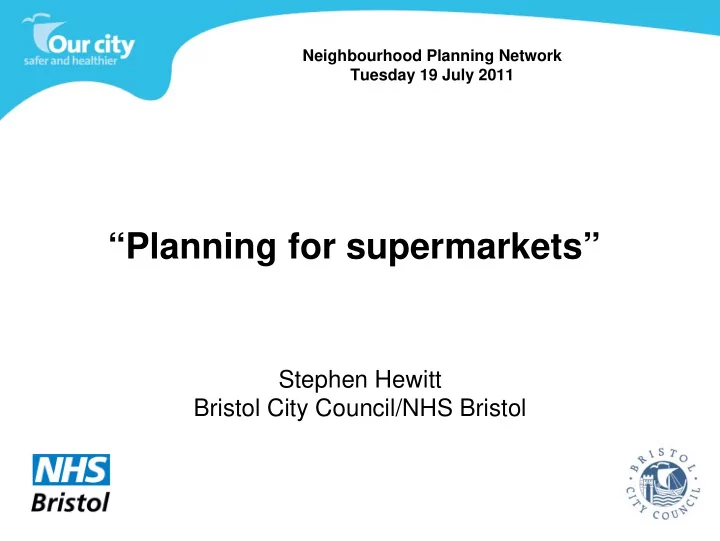

Neighbourhood Planning Network Tuesday 19 July 2011 “Planning for supermarkets” Stephen Hewitt Bristol City Council/NHS Bristol
The Food Agenda • Bristol Food Network • Food Charter • Annual Food Conference • Procurement • Community Growing • Food Policy Council • www.bristol.gov.uk/food
www.bristol.gov.uk/ whofeedsbristol
A new approach • Be clear about what we want to achieve ; what is the harm we want to avoid/mitigate. • Identify clear, objective and justifiable criteria that can be used to distinguish between different retailers or between different retail uses. • Have a strong evidence base to support our actions. In pioneering a new approach there will be strong challenges. • Recognise that retailing is a dynamic market that may not respond as anticipated. In trying a new approach, there may well be unintended consequences. • Different regulatory regimes • Positive support for local centres
Supermarkets A clear distinction needs to be made between: • The building (eg small convenience store or large superstore, is it accessible and well-designed or not, what are the servicing arrangements, is it a listed building, is it new build or refurbishment) • The location (in centre, out of centre, in a prosperous vibrant centre or a poorly performing centre on a deprived outer estate, in a conservation area) • The use (retail or non-retail; what is being sold, when is it open) • The operator (eg a local independent, a franchise, a local retail chain, a national or international multiple retail chain) Which factors can/should planning control ?
Planning concerns? • The diversity, character, vitality and viability of local centres . In some centres the concern is the "clone town Britain" effect, where there are other poorly performing centres where a supermarket anchor store would be welcomed • Servicing and delivering to stores . The servicing requirements of a convenience supermarket are very different to other retail uses • The loss of community pubs to retail • The local economy and local employment – including the impact on local suppliers and the wholesale and distribution infrastructure
A fit and proper organisation • Agricultural practices • Relationships with suppliers • Food production and distribution (food miles) • Packaging and food waste • Healthy eating • Climate change and use of fossil fuels • Consumer choice and enterprise • Monopoly and competition (national and local)
Beyond Planning • Sustainable Communities Act 2007 • Local Government Act 2000 – promotion of economic, social and environmental wellbeing • Localism Bill – general power of competence • Bye-laws • Licensing/registration – pubs, betting shops, off-licences, sex shops • Pharmacies - control of entry - necessary or desirable • Office of Fair Trading – local monopolies • Lessons from abroad
An opportunity? • The review of the Use Classes Order and General Development Order • Deadline for responses of 1 September 2011 • www.communities.gov.uk/publications/p lanningandbuilding/changeuseissues • National Planning Policy Framework?
A New Use Class A1? a) Small convenience store (up to 250 sq m) b) Supermarket – larger convenience store (over 250 sq m) c) Small comparison store (up to 250 sq m) d) Larger comparison store (over 250 sq m) e) Pharmacy f) Other retail (hairdressers, travel & ticket agencies, domestic hire shops, dry cleaners, funeral directors, internet cages, sandwich bars)
Contact Stephen Hewitt Specialist Professional Planner (Healthy Living/Health Improvement) Bristol City Council City Development Brunel House St George's Road Bristol BS1 5UY Tel: 0117 922 2756 E-mail: stephen.hewitt@bristol.gov.uk www.bristol.gov.uk/health
Recommend
More recommend